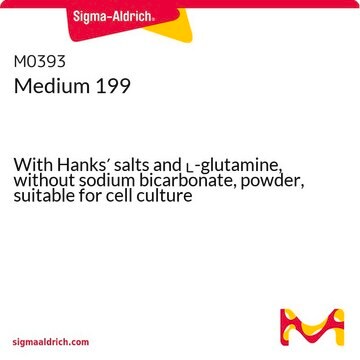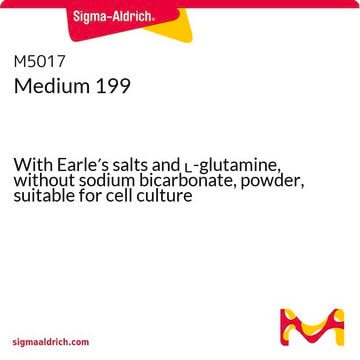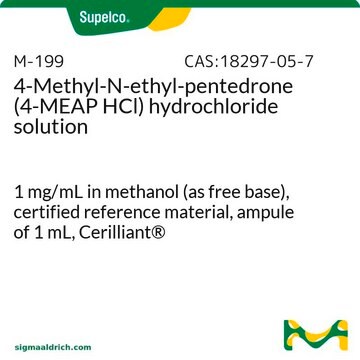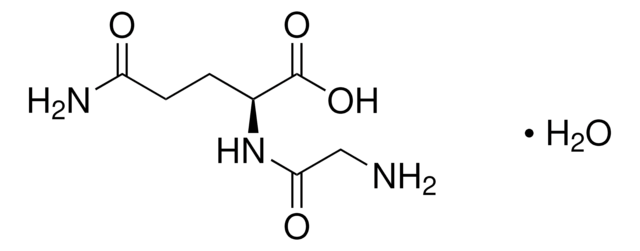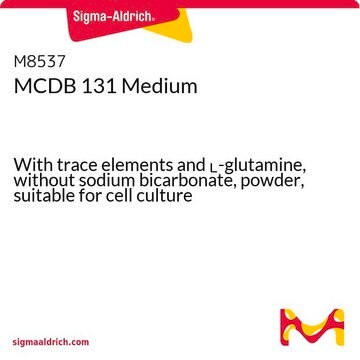추천 제품
Quality Level
양식
powder
기술
cell culture | mammalian: suitable
성분
L-glutamine: no
phenol red: no
HEPES: no
sodium pyruvate: no
Earle’s salts (5% CO2): yes
NaHCO3: no
배송 상태
ambient
저장 온도
2-8°C
유사한 제품을 찾으십니까? 방문 제품 비교 안내
일반 설명
Medium 199 is a combination of vitamins, amino acids, and other factors that were originally developed as a completely defined media formulation for the culture of primary explants. This medium, when properly supplemented has broad applicability, particularly for non-transformed cells. Medium 199 is widely used for vaccine production, in vitro cultivation of primary pancreatic explants, and lens tissues.
애플리케이션
Medium 199 has been used:
- to culture the primary human umbilical vein endothelial cells (HUVECs) for use in cell viability assay
- to flush the uterine horn of gilts to recover day 12 conceptuses from uteri
- to culture the peritoneal cells and immortalized human mesothelial cells (MeT-5A and ATCC-CRL-9444)
수량
Formulated to contain 9.4 grams of powder per liter of medium.
재구성
Supplement with 0.1 g/L L-glutamine, 2.2 g/L sodium bicarbonate.
또한 이 제품과 함께 일반적으로 구입
제품 번호
설명
가격
Storage Class Code
13 - Non Combustible Solids
WGK
WGK 1
Flash Point (°F)
Not applicable
Flash Point (°C)
Not applicable
가장 최신 버전 중 하나를 선택하세요:
시험 성적서(COA)
Lot/Batch Number
이미 열람한 고객
Luciana de Lima Ferreira et al.
PLoS neglected tropical diseases, 14(12), e0009015-e0009015 (2020-12-29)
Trypanosoma rangeli is a non-pathogenic protozoan parasite that infects mammals, including humans, in Chagas disease-endemic areas of South and Central America. The parasite is transmitted to a mammalian host when an infected triatomine injects metacyclic trypomastigotes into the host's skin
Diane G Edmondson et al.
mBio, 12(1) (2021-02-25)
The bacterium that causes syphilis, Treponema pallidum subsp. pallidum, has now been cultured in vitro continuously for periods exceeding 3 years using a system consisting of coculture with Sf1Ep rabbit epithelial cells in TpCM-2 medium and a low-oxygen environment. In
Klaus Kratochwill et al.
Nephrology, dialysis, transplantation : official publication of the European Dialysis and Transplant Association - European Renal Association, 27(3), 937-946 (2011-08-23)
Exposure of mesothelial cells to peritoneal dialysis fluids (PDF) results in cytoprotective cellular stress responses (CSR) that counteract PDF-induced damage. In this study, we tested the hypothesis that the CSR may be inadequate in relevant models of peritoneal dialysis (PD)
Hung-Chang Chou et al.
Colloids and surfaces. B, Biointerfaces, 208, 112136-112136 (2021-10-11)
Nitric oxide (NO) is a potential therapeutic agent for various diseases. However, it is challenging to deliver this unstable, free-radical gaseous molecule in the body. Various nanoparticle-based drug delivery systems have been investigated as promising NO carriers without detailed characterization
J L N Barratt et al.
Parasitology, 137(13), 1867-1878 (2010-07-09)
Dientamoeba fragilis is a pathogen of the human gastrointestinal tract that is a common cause of diarrhoea. A paucity of knowledge on the in vitro cultivation and cryopreservation of Dientamoeba has meant that few studies have been conducted to investigate
문서
Medium 199 supports non-transformed cell cultivation in virology and vaccine production, offering broad species applicability.
자사의 과학자팀은 생명 과학, 재료 과학, 화학 합성, 크로마토그래피, 분석 및 기타 많은 영역을 포함한 모든 과학 분야에 경험이 있습니다..
고객지원팀으로 연락바랍니다.
